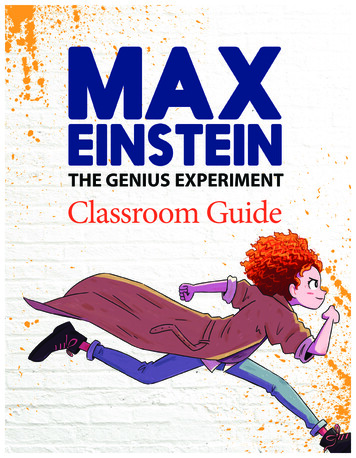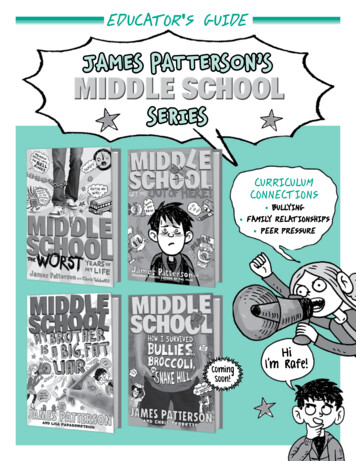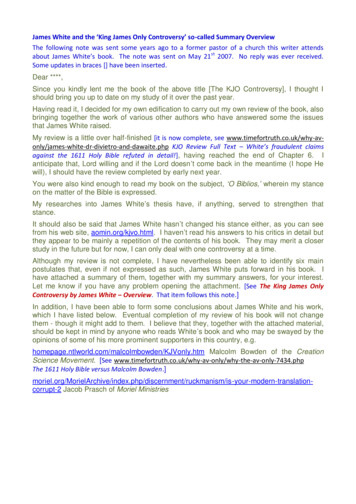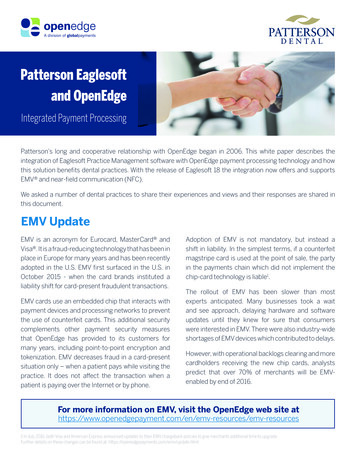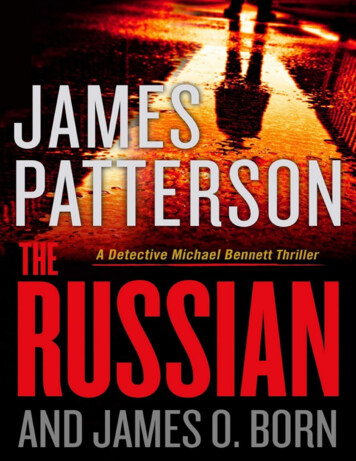
Transcription
The characters and events in this book are fictitious. Any similarity to real persons, living or dead, is coincidental and not intended bythe author.Copyright 2021 by James PattersonExcerpt from The Red Book copyright 2021 by James PattersonHachette Book Group supports the right to free expression and the value of copyright. The purpose of copyright is to encouragewriters and artists to produce the creative works that enrich our culture.The scanning, uploading, and distribution of this book without permission is a theft of the author’s intellectual property. If you wouldlike permission to use material from the book (other than for review purposes), please contact permissions@hbgusa.com. Thank youfor your support of the author’s rights.Little, Brown and CompanyHachette Book Group1290 Avenue of the Americas, New York, NY k.com/littlebrownandcompanyFirst Edition: January 2021Little, Brown and Company is a division of Hachette Book Group, Inc. The Little, Brown name and logo are trademarks ofHachette Book Group, Inc.MICHAEL BENNETT is a trademark of JBP Business, LLC.The publisher is not responsible for websites (or their content) that are not owned by the publisher.The Hachette Speakers Bureau provides a wide range of authors for speaking events. To find out more, go tohachettespeakersbureau.com or call (866) 376-6591.ISBN 978-0-316-43024-1 (ebook)LCCN 2020932834E3-20201211-DA-NF-ORI
ContentsCoverTitle PageCopyrightChapter 1Chapter 2Chapter 3Chapter 4Chapter 5Chapter 6Chapter 7Chapter 8Chapter 9Chapter 10Chapter 11Chapter 12Chapter 13Chapter 14Chapter 15Chapter 16Chapter 17Chapter 18Chapter 19Chapter 20Chapter 21Chapter 22Chapter 23Chapter 24Chapter 25Chapter 26Chapter 27Chapter 28Chapter 29Chapter 30Chapter 31Chapter 32Chapter 33Chapter 34Chapter 35Chapter 36Chapter 37Chapter 38Chapter 39
Chapter 40Chapter 41Chapter 42Chapter 43Chapter 44Chapter 45Chapter 46Chapter 47Chapter 48Chapter 49Chapter 50Chapter 51Chapter 52Chapter 53Chapter 54Chapter 55Chapter 56Chapter 57Chapter 58Chapter 59Chapter 60Chapter 61Chapter 62Chapter 63Chapter 64Chapter 65Chapter 66Chapter 67Chapter 68Chapter 69Chapter 70Chapter 71Chapter 72Chapter 73Chapter 74Chapter 75Chapter 76Chapter 77Chapter 78Chapter 79Chapter 80Chapter 81Chapter 82Chapter 83Chapter 84
Chapter 85Chapter 86Chapter 87Chapter 88Chapter 89Chapter 90Chapter 91Chapter 92Chapter 93Chapter 94Chapter 95Chapter 96Chapter 97Chapter 98Chapter 99Chapter 100Chapter 101Chapter 102Discover MoreAbout the AuthorsA Preview of The Red BookChapter 1Chapter 2Chapter 3Books by James Patterson Featuring Michael Bennett
What’s coming next from James Patterson?Get on the list to find out about coming titles, deals, contests, appearances, and more!The official James Patterson newsletter.
Chapter 1I checked the street in both directions in front of an upscale coffee house called FlatBread and Butter on Amsterdam Avenue near 140th Street. The street was about as quiet as NewYork City gets.There’s never a good time to be breaking in a new detective on the squad, but this moment was oneof the worst. The new detective’s name was Brett Hollis. He was a sharp up-and-comer. He may nothave been experienced, but he looked good. Full suit and tie. Not a hair out of place. He almostlooked like he could be one of my kids dressed for church.Occasionally I have a hard time trusting a well-put-together cop. I figure cops who take the jobseriously have a permanent disheveled look. Like mine.Hollis was also young. Maybe too young.My lieutenant, Harry Grissom, hadn’t used the word babysit, but he’d said to make sure this kiddidn’t get into any trouble. Sort of what a babysitter does. Normally I wouldn’t mind, but we were inthe middle of a major murder investigation.Chloe Tumber, a first-year student at Columbia Law, had been found stabbed to death with somekind of sharp tool. One Police Plaza was keeping recent developments quiet, but Chloe was the thirdvictim—after one in the Bronx and another in Brooklyn—to die by similar means. The stab woundshad been made by blades with slightly different markers. We suspected the killer had a toolbox full ofsharp implements.I turned to the rookie and said, “Remember, this guy Van Fleet is a person of interest. Notnecessarily a suspect. Follow my lead.”Hollis nodded his head nervously, saying, “We need to call in our location.”“Why?”“Policy says we have to check in on the radio for safety reasons.”I smiled at the young detective. “I appreciate your knowledge of the NYPD policy manual, but inreal life, if we called in every location we stopped at, we’d do nothing but use the radio all day.” Istepped into the coffee house without another word, trusting Hollis would follow.The coffee house was narrow, with about ten tables and a bar with ten stools. A good-lookingyoung man wearing the name tag JESSE stood behind the counter and welcomed us.I said, “Is Billy around?”“You guys cops?”Hollis stepped forward and said, “What about it?”Jesse shrugged. “You got the look. Listen, Billy doesn’t steal from me and he shows up for hisshifts—that’s all I care about.” Jesse set down his rag and jerked his thumb toward the rear of thenarrow coffee house. “He’s in the back.”
I followed Hollis through the constricted hallway, boxes of paper towels and toilet paper stackedalong the walls. Hollis walked past the bathrooms and storage room into the kitchen. That’s where wefound Billy Van Fleet. The tall, slim, pale twenty-eight-year-old was busy washing dishes. He lookedup and smiled, clearly making us for police officers. Guess we did have the look.I saw Hollis take a step forward, and I placed a gentle hand on his shoulder, saying, “Be cool.”“What can I do for you, Officers?” the dishwasher asked, drying his hands and straightening hisshirt.I held up my shield. “Billy Van Fleet?”He nodded.“When was the last time you saw Chloe Tumber?”“Why?”Hollis’s demeanor changed in an instant. “We’re asking the questions,” he snarled.Van Fleet held up his hands and said, “Okay, okay, just asking.”Hollis kept going. “How about you tell us where you were last night between 8 and 11 p.m.”Van Fleet kept his eyes on Hollis, which I figured I’d use to my advantage. Maybe I’d let my newpartner lead the interview. That way I could watch Van Fleet and see what made him nervous.Right now he seemed very calm. Until suddenly he wasn’t. Without warning, he spun and sprintedaway from the sink, blasting through the rear exit. He was fast.Hollis broke into a run, calling over his shoulder almost cheerfully, “He’s our man!” just as VanFleet hit the safety bar on the door, letting sunshine flood into the dark kitchen.
Chapter 2I could’ve brokeninto a run with Brett Hollis. But that would’ve beencounterproductive. Hollis was trying to keep the suspect in sight. I was sure he’d give this guy a goodrun for his money. But veteran cops don’t engage in foot chases. Experience is supposed to teach yousomething. It taught me to either find a car or use my head.I knew this neighborhood. Every block of it. Traffic had picked up on Amsterdam Avenue, and noone runs toward a busy street. This guy had a plan. I figured he’d take the alley a block down andmove away from any pedestrian traffic. If I were him, I’d head toward St. Nicholas Park. It wasn’tthat far away.I broke into a light jog. We needed this guy—make no mistake. Van Fleet was the first lead we’dhad in Chloe Tumber’s homicide. Which, despite the different blades used, looked to be connected tothose two other cases. All three victims were young women who’d suffered gruesome injuriesmoments before their deaths. And the three crime scenes looked similar. Messy. Though I couldn’tshake the feeling that the mess was deliberate, almost designed for effect. We were still developing atheory as to why.I found the garbage alley I was looking for between two buildings, with its gates, as usual, leftwide open. Then I saw an abandoned dog leash. A long one. Maybe twelve feet, and already hookedto a pole behind a pizza place. I took the leash in my hand and stepped to the other side of the alley.Ten seconds later, as if on cue, Van Fleet slid around the corner, ducked a drainage pipe that stuckout into the alley, and picked up the pace again. He never even saw me. As he neared the dog leash, Ijerked the line. His feet tangled and he tumbled down onto the alley’s nasty asphalt, slipping in somepizza grease congealed in the middle of the alley and knocking over an empty forty-ounce beer bottlelike it was the last bowling pin in the lane.Before I could even reach Van Fleet, Hollis barreled around the corner. He didn’t notice thedrainage pipe, and ran full speed into it, headfirst. The impact made the pipe reverberate like a gongand knocked him completely off his feet. I could only imagine what the collision sounded like insidehis brain.I cuffed the suspect, then looked over at Hollis. His nose was flattened, blood spraying from it likea busted sprinkler attached to his face. “You okay, Brett?”He mumbled, “I’m good,” as he struggled to his feet. Blood poured onto his clean white shirt andmade dark stains on his power tie.With Van Fleet’s hands cuffed behind his back, I helped him up and started to lead him back to thecoffee house. I didn’t want to embarrass Hollis, so I walked slowly as he tried to keep up.Hollis’s wound was so spectacular, a corner bodega owner abandoned the outdoor displays shewas stocking and rushed inside for a handful of crumpled paper towels. She forced them on Hollis,
who held them to his nose.Hollis wasn’t complaining. I had to admit, I liked his toughness.
Chapter 3As soon as we got back to Flat Bread and Butter, we slipped in the same back door we’dall burst out of. I don’t think Jesse even realized we’d left the building.I sat Van Fleet down on a stool next to an oven. “Why’d you run when we asked you about Chloe,jerk-off?”“She’s always complaining that I’m too clingy, that she’s too busy with law school and her parttime job to have time for me. She said if I didn’t give her some space, she’d call the cops on me.” Hesighed.“What’d you do when she said that?”“Nothing. I haven’t called her in a week.” He paused and cut his eyes to Hollis and me. “Okay,maybe I tried to call her a couple of times.”Hollis plopped down on a chair next to a metal desk built into the wall. He didn’t look good. Isaid, “Why don’t you go get that checked out, Brett?”“I’m fine.” He’d added some paper towels from the kitchen to the ones from the bodega. It was agiant ball of paper, slowly turning dark red.I turned back to Billy Van Fleet. “Three days ago Chloe Tumber made an official complaintagainst you, said that you’d been stalking her. I don’t suppose you can tell me where you were lastnight, can you?”“Here.” He shrugged. “I was here from 6 p.m. until one o’clock. Never left. Jesse was here withme the whole time.”I shot a quick look at Hollis, who jumped off his chair and headed to the front of the restaurant totalk to Van Fleet’s boss. A minute later, he came back and nodded. “It checks out.”“Someone slipped into Chloe’s apartment last night and murdered her. Your history of harassment,plus the running, makes you look like a good suspect. Convince us otherwise.”For his part, Van Fleet looked legitimately stunned. “Chloe’s dead?”I quickly filled him in, leaving out the details of the bloody scene at her apartment.It had been gruesome. I could tell Hollis had been trying hard to hold it together back at ChloeTumber’s apartment. He’d choked up. “He stabbed her in the eye?” he’d said, his voice breaking.He’d picked right up on the most distinct detail, the kind that could never be revealed to the mediafor fear of giving ideas to budding criminal minds.I’d held his arm for a moment and said, “Everyone gets a little shaky in the aftermath of a violentmurder, Brett. This is bad. Really bad. I wanted you to see how bad things can get.”All cops are human. Any one of us who tells you crime scenes don’t affect them is lying. Yes,we’re professionals. Yes, we’ve seen it before. It’s especially hard for those of us with children.Every time I view a messy crime scene, it’s hard not to think of the victim as someone’s kid, and I
always say a silent prayer for them and their families.But Billy Van Fleet was taking the news remarkably well.“If you didn’t kill her, who did?” I asked.Total silence from Van Fleet.I looked at him and said, “We need to find out what happened to Chloe, if there was anyone whowanted to hurt her. I don’t understand why you wouldn’t talk to us.”“Never talk to the cops. Never snitch. It’s bad for the reputation,” he said, like it was a mantra.“What reputation? Aside from a lot of petty arrests, you live with your parents and work at acoffee house that makes Starbucks look like a hellhole,” Hollis scoffed.The skinny white guy had a smile on his face as he said, “I’m a gangsta—that’s what we do. Ilearned a long time ago that nothing happens to me if I run from the cops. I figured it out on my secondarrest. I’m up to sixteen arrests and haven’t been proven wrong. I’ve never gotten one extra day in jailfor running from the cops. I even have a blog about it.”Gangsta? Give me a break. Van Fleet had none of my young partner’s toughness. And I was lessthan impressed at how quickly he seemed to have already moved on from the news we’d justdelivered—that the woman he’d been obsessed with had been murdered. Then I made a connection.“Has this got something to do with your half-ass acting persona?”“There’s nothing half-assed about staying in character. It will serve me well when my one-act playopens Off-Broadway next month. I’m playing a convicted felon who doesn’t put up with any shit.”I said, “Well, I’m playing a cop who’s tired of putting up with shit.”I was pissed off. And we were no closer to finding Chloe Tumber’s killer.
Chapter 4Daniel Ott, tech consultant, gazed at the New York Daily News sitting on his desk inthe Manhattan Family Insurance office. He smiled. The headline, in bold letters, said, THREE’S NOCHARM IN BIG APPLE MURDERS.Numbers were logical. People were not. Besides, he loved the thought that all of New York Citywas reading about the murders he had committed.When Ott looked up, he noticed the heavyset office administrator, Warren Talbout, heading hisway. Ott quickly resumed his work, installing the desktop computer software his company had createdto facilitate communications integration between phones and computers.Talbout, who wore a graying walrus mustache, stopped by and said, “How’s the upgrade going,David?”Ott looked up. “It’s Daniel. And the upgrades are coming along fine. I should be finished latertoday.”The office administrator nodded and waddled away. Ott wasn’t upset the man had gotten his namewrong. Few people in any of the offices where he worked bothered to learn his name. He was onlyever anywhere for about two weeks at a time. Just a reasonably friendly, totally nondescript guy whomade it easier for them to move data between their phones and their computers.In fact, he liked to think that no matter where he went no one ever noticed him, like a forgettablepiece of furniture. He was about five foot ten and one hundred sixty-five pounds, slim for adult malesin the US. With no distinctive features whatsoever.Young Ott had been taunted for being thin and sickly. But as he learned and grew, he found hecould do things no one else could. He understood math and numbers like most people did language,though he was also good with languages. He’d easily landed this job with Computelex. He madeplenty of money and got to fly across the entire country—business class.Mostly, Ott blended in and traveled with hardly anyone even speaking to him. He was happy he’dfound uses for his superpower. Now he was the one doing the taunting.Ott read some of the article. No comment from the NYPD spokeswoman about details connectingthe murders. Ott knew TV news wasn’t as careful as print. News shows would play up an angle toincrease ratings; before too long, they’d create special graphics and theme music for these murders.He didn’t want to be too obvious, but he couldn’t keep his eyes off the page. He’d stop everycouple of seconds to look up and nod hello to someone walking past. Everyone who worked at theinsurance company stayed busy and avoided idle chitchat. That focus gave him room to indulgehimself in this big comfortable office, with its north-facing view of the park and abundant takeoutoptions—all the trappings of a secure, safe haven.His cell phone chimed with a short, low, professional tone. He smiled and snatched the phone
from his belt. Technically it was his lunchtime. His mouth stretched into a wide grin as he said,“Hello, sweetheart.”He was surprised by giggles and his two daughters sing-songing together, “Hello, Papa!”“Hello, my little dumplings. I thought it was your mother calling.”“She’s right here. We wanted to surprise you.”“And what a great surprise it is.” Ott’s three-year-old, Tatyana, and five-year-old, Lilly, were hisabsolute prizes. He worked hard so that they would never know hard times. And he was raising themto be polite and respectful. Thankfully their mother, Lena, had few of the arrogant habits mostAmerican women did.Lena was Polish and had proven to be a good wife and a great mother. She was simple and sweet,very meek. They’d met online, and Ott quickly knew she was the woman for him. He even spoke afair amount of Polish. They used it as a code to talk privately around the girls.He chatted with his daughters, who told him about their homeschool lessons, the books they werereading (or pretending to read), and how they’d raced their mother and won.Ott never would’ve imagined he could feel as much love as he did for these girls. He wondered ifeither of his parents had felt anything for him approaching the love he had for his daughters. Hedoubted it—his father had barely acknowledged him, except to make mean jokes, and his mother hadjust seemed exhausted all the time. When she died, Ott had felt relief for her, that she could finallyrest. Since then, he’d probably spoken no more than thirty words total to his father.Lena got on the line, and his mood shifted. His wife tended to bring up less enjoyable topics,problems that needed solutions. She said, “We need to enroll the girls in a dance class. And the doghas a cough again.”Ott hid a groan as he hurried his wife off the phone. “I’m sorry, dear, I have to get back to work.”She said she understood and told him she couldn’t wait to see him. He smiled after hanging up,thinking about his two separate—and very different—lives. Over the past year, it had become clearthat he needed both to survive, though it was a daily challenge to keep them from crashing into eachother.Ott loved his wife and girls, but he couldn’t deny himself the pleasure he got from killing. Thefeeling could make his head spin, and he had an increasingly difficult time containing his urges. Hefelt the sensation in his entire body, like wave after wave of excitement. A release. A renewal. Hewouldn’t describe it as sexual in nature—it was more primal and satisfying.Usually the victims were obvious to him. It had to do with their attitudes. That was his catalyst, hisreason to act: he could not abide women with insolent, demeaning attitudes. He no longer put up witharrogance and ridicule from women. Nor could he understand why American women thought theywere smarter, prettier, and more important than anyone else in the world. There was something abouttheir egotistical speech patterns that shocked his nervous system.His work dictated the pace he kept in his avocation. Since he only took victims outside his homearea, occasionally choosing his next victim from an office where he had done contract work, thelength of his business trips determined how patient he could be.He did his best to be patient, let some time lapse. Usually. But sometimes the urge hit him sostrongly that he couldn’t wait.He’d been in New York for only about a month now and had already succumbed to the temptationof three perfect victims. It was more than he usually allowed himself, but then again, in a city as big
as New York, he was almost surprised the media had even connected them. Not that he wasconcerned. At each crime scene, he’d been careful not to leave any evidence that could be linked tohim, and careful about security cameras.Today would be his last day in this office. He’d figured out a way to reroute the company’scomputer network to integrate more easily with the software he was installing. He never bothered toexplain his work to the clients, just to his boss back at Computelex headquarters in Omaha. HQ wasthe only one he needed to impress.Ott moved from his desk to work at a control box in a tiny room at one end of the floor. He hadbeen in there before and realized that from that vantage, he could hear everything in the manager’soffice, the copy room, and the break room, which all surrounded the control box.As he worked, he overheard two women talking. It took him a moment to realize they werestanding in the break room. He recognized one of the voices as belonging to an intern, a smart girlfrom somewhere north of the city.He was about to go back to his desk when he heard the intern say, “How much longer is thattelephone tech going to be here?”The other woman said, “I think he’s supposed to finish up today.”“I’m so glad I’m studying communications in college. I’d hate to do such lonely, anonymous work.It doesn’t suit me.”Ott stood still for a moment. Silent. Furious. Who the hell is this arrogant bitch to think she isbetter than me? In fact, he was widely recognized in the industry as one of only six or seven techs inthe whole country who could do what he did. And he got paid well for it too. More than this bitchintern would ever make in communications or whatever useless degree she was getting.His hand started to tremble with anger. Then he smiled with a new sense of purpose.He always felt energized the moment he found a new victim.
Chapter 5It wasn’t quite nightfall by the time I got home to my family. I’ve spent my career tryingto keep my family life as separate from my work life as possible. If I’m thinking about some gruesomecrime I’m investigating, I’m not focusing on the kids the way I need to be, and it’s important to focusexclusively on the children for a fair amount of time each day.But today was one of those days that wore me down. The unidentified killer who’d violentlymurdered these women had gotten into my head. It was hard to stop thinking about the case, even as Iwas welcomed home by three beautiful, happy young girls.Though frankly I’d expected more than 30 percent of my kids to greet me at the door.That’s right, I have ten children. Six girls and four boys. All adopted. Each with his or her ownunique personality and challenges. And I wouldn’t trade a single one of them for anything in theworld, though as anyone with a lot of kids will tell you, it takes an enormous amount of energy.My twins, Bridget and Fiona, were always good for a double hug, and my youngest, Chrissy, stillinsisted on a giant hug and a quick lift and whirl around the room. It’s possible she didn’t insist asmuch as she used to. But I still did it anyway, every day.I wandered farther into the apartment and found my fiancée, Mary Catherine, sitting at a smallwriting desk in our bedroom, working on some wedding details. We were getting married in a matterof weeks, and the quick look she gave me revealed that she was feeling rather overwhelmed.“I need some fresh air,” Mary Catherine said. “Get changed, real quick. You promised we’d rideour new bikes at least three times a week. Let’s go.”I knew not to argue. Also, it’s bad policy to ignore commitments. And I never break a promise. Ittook me only a minute to slip out of my work clothes and into sweatpants and a Manhattan College Tshirt. Underneath the school’s logo it said, PHILOSOPHY, IT’S SO MUCH MORE THAN A MAJOR . The kidshad gotten me the shirt as a joke gift for my birthday since that had been my major in college. I lovedit. The joke was on them. Philosophy was a lot more than just a major.As we slipped out the front door, Mary Catherine called over her shoulder, “Ricky, finish updinner. Your great-grandfather will be here in a few minutes. He can get everyone organized. We’llbe back in thirty to forty minutes. Less if I have to call an ambulance for your father.”Mary Catherine’s lilting Irish accent didn’t make these sound like a series of orders she expectedto be carried out precisely. But both the kids and I knew that when she used that tone of voice, shewas on a mission. In this case, it was our newest hobby: riding mountain bikes.You might ask, Who buys mountain bikes when they live in Manhattan? The answer is, anyonewho wants to work up a sweat without going forty miles an hour on a racing bike.We collected our bikes from the basement and took off. Within twenty seconds of riding behindMary Catherine, I knew we were headed to her favorite bike trail, which runs along the river next to
the Henry Hudson Greenway. It was an easy trail to get to from our building, and if she wanted towork out hard—which she obviously did—this was the spot. When Mary Catherine got like this, itwas all I could do to keep up as she pedaled with wild abandon. And God help any poor tourist whohappened to step in front of her.I was huffing and puffing a little bit as I pushed my Fuji off-road mountain bike to catch up to MaryCatherine. Between gasps for air, I managed to eke out, “Something you need to talk about? This isn’tjust blowing off steam on the bike path. This is running your engine so hard you could blow a rod.”That made her smile and slow her pace considerably. There really weren’t many people around.This was also where she liked to talk about sensitive subjects. It was about the only way we could besure the kids weren’t listening in somehow.Mary Catherine said, “Everything just seems to be happening at once. The wedding, the kidsgetting all sorts of new interests and making new friends, and Brian’s readjustment to life after prison.It’s a lot to take on.”“No doubt. And you’ve done a phenomenal job.”“I didn’t drag you out here for compliments. We both need the exercise. I’m going to fit into thatwedding dress if I have to have my spleen removed.” Mary Catherine paused, then said in a serioustone, “I’d really like to talk about Brian.”Even a smart-ass like me knew not to joke. “What’s up?”Mary Catherine said, “He disappears during most of the day. Just slips out sometime in themorning and sort of reappears in the afternoon.”I said, “I’ve been careful not to question him too closely. It’s important we show that we trusthim.”“Yes, but I feel like we’ve been walking on eggshells, maybe giving him too much leeway. He’sgot to understand the rules we laid down when we allowed him to return home, the rules aboutmaking good use of his time. And I worry that he’s not making good use of his time. I worry that he’sbreaking our trust.”“I get it. But he hasn’t been out that long. He’s still readjusting. Let’s give it just a little time. Atleast a few more days. Then we’ll sit down with Brian and see what’s going on. How’s that sound?”She looked over her shoulder and said, “Like we’re going to have to ride really hard for that to beokay with me.” She started pumping the pedals faster than I thought possible. If nothing else, this newhobby was going to shore up my aerobic ability. Not that I was planning to engage in any foot chases.
Chapter 6We rode for about half an hour more, then returned home. It didn’t take long for us to storethe bikes in the basement. We chained them in the storage area and gazed in amazement at the tenother bikes of various sizes locked up next to them.I’d read that New York was in the top ten of US cities for biking. Certainly the dozen members ofmy immediate family helped contribute to that statistic.I planned to stay in my sweaty clothes for dinner until Mary Catherine gave me a look.“Oh, c’mon,” I said. “It won’t kill the kids to smell their dad once in a while.”“I wouldn’t have a problem with it usually,” she replied, “but we’re having a guest for dinner.”“If you start calling Seamus a guest, we’re never going to have a comfortable dinner again.”“It’s not your grandfather. Jane has a friend coming over.”“That’s nice. What’s her name?”“It’s a boy.” She hesitated, then added, “A boyfriend.”“You mean a friend who happens to be a boy, right?”“You wish.”I thought about it for a moment. “I’m not sure I’m ready for Jane to have a boyfriend.”“Fathers never are. Yet the fact remains. We both need to clean up because the boy will be hereshortly.”“Is he from Holy Name?”Mary Catherine nodded. “Allan Martin III.”“Is his dad the hedge fund guy?”“He is.”I wasn’t sure how to respond. This was a lot for me to take in. Jane was my third-oldest child,after Juliana and Brian. I’d come to terms with Juliana dating, and I thought I was prepared to dealwith the other girls doing so too. Apparently I was wrong. I still had four even younger daughters. Ihated to think what my future held.Mary Catherine got cleaned up first, then I took a quick shower. When I wandered back into thekitchen, I was impressed to see how efficiently Ricky, my second-oldest son, had managed to pulltogether a spectacular spaghetti dinner and get everyone involved. I saw the table was already set,and my grandfather, Seamus, sat at the far end, sipping a glass of red wine, looking well dressed inhis clerical collar.“Comfortable, Seamus?” I asked as I strolled into the dining room.“Aside from the sarcastic questioning, everything is great. How about you, my boy?”“Peachy.”Then the doorbell rang and I heard my normally reserved, incredibly smart daughter Jane squeal.
An honest-to-God squeal. What is happening?Young Allan Martin III turned out to be a nice-lookin
Books by James Patterson Featuring Michael Bennett. What’s coming next from James Patterson? Get on the list to find out about coming titles, deals, contests, appearances, and more! The official James Patterson newsletter. Chapter 1 I checked the street in both d

